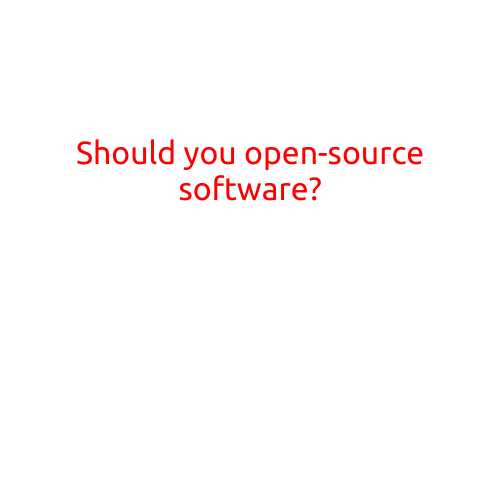
Should You Open-Source Your Software?
In today’s technology-driven world, software development has become an integral part of many businesses and individuals. With the increasing demand for efficient and cost-effective solutions, many developers are now considering open-sourcing their software. But the question remains: is open-sourcing the right move for your software?
In this article, we’ll delve into the pros and cons of open-sourcing your software, helping you make an informed decision about whether it’s the right choice for your project.
What is Open-Source Software?
Open-source software is a type of software that is released under a license that allows users to access, modify, and distribute the software freely. This means that anyone can view, modify, and distribute the software’s source code, as long as they comply with the terms of the license.
Pros of Open-Source Software:
- Community Support: Open-source software often attracts a community of developers who contribute to the software’s development, testing, and improvement. This can lead to faster bug fixes, new features, and better overall quality.
- Cost-Effective: Open-sourcing your software means you don’t have to pay for maintenance, updates, or bug fixes. The community takes care of it for you.
- Increased Security: With multiple eyes on the code, open-source software is often more secure than proprietary software, as any security vulnerabilities are quickly identified and fixed.
- Flexibility: Open-source software can be customized to meet specific needs and can run on a wide range of platforms.
- Brand Building: Open-sourcing your software can increase your reputation as a developer and attract new customers, partners, and talent.
Cons of Open-Source Software:
- Licensing and Ownership: When you open-source your software, you may lose ownership and control over the code. This can be a concern if you’re attached to the idea of owning your code.
- Intellectual Property: Open-sourcing your software may put your intellectual property at risk, as others could potentially use your code to create their own competing products.
- Limited Commercial Potential: Open-source software often has limited commercial potential, as users are not required to pay for the software.
- Support and Maintenance: While the community may provide support and maintenance, you may still need to invest time and resources to ensure the software remains stable and functional.
When Should You Open-Source Your Software?
Open-sourcing your software may be the right choice if:
- You’re a Non-Profit or Academic Institution: Open-sourcing your software can help promote sharing and collaboration, aligning with your organization’s values.
- You’re Looking to Build a Community: Open-sourcing can attract a community of developers who can contribute to your software’s growth and improvement.
- You Want to Increase Transparency: Open-sourcing your software can demonstrate your commitment to transparency and accountability.
Conclusion
Open-sourcing your software can be a great way to promote collaboration, attract a community of developers, and improve the overall quality of your software. However, it’s essential to weigh the pros and cons carefully and consider your goals, values, and concerns before making a decision.
Ultimately, open-sourcing your software is a strategic move that requires careful consideration. Take the time to evaluate your options and make an informed decision that aligns with your goals and values.
Additional Resources:
- GitHub Open-Source Software: A collection of open-source software projects on GitHub.
- Open-Source Software FAQs: A comprehensive guide to open-source software, covering topics such as licensing, ownership, and community development.
About the Author:
[Your Name] is a software developer and writer with [Number] years of experience in the tech industry. With a background in [specific area of expertise], [Your Name] has written extensively on software development, open-source software, and technology trends.





